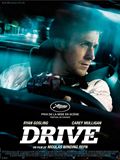
|
Drive review
:. Director: Nicolas Winding Refn
:. Starring: Ryan Gosling, Ron Perlman
:. Running Time: 1:35
:. Year: 2011
:. Country: USA
|
Having surprised us earlier with Valhalla Rising, a metaphysical masterpiece on the edge of experimental cinema, which reinvented the Vikings subgenre in a film that owed nothing to Hollywood clichés, we could justly wonder what director Nicolas Winding Refn would do with the classic story of a lone hero who gets in trouble after a heist went bad.
Assuming completely the second degree, but taking itself seriously without showing it, Drive aims at revisiting 80's B -movies, with panache and a certain sense of guilty pleasure. From the opening sequence with its pink Miami Vice-style title to the Giorgio Moroder-like electronic music used for the soundtrack, the filmmaker presents his movie as a delightful and faded piece of pop art.
The camera wanders above the streets of Los Angeles (the plot could only be placed in this city, a symbol of the golden age of film noir and cinema itself), between two sequences in the cabin of a car driven by a feline-looking young man (Ryan Gosling, taciturn, with an assured body posture). We find out quickly that he works at night as a taxi driver for the mafia, guaranteeing their safety. During the day, he fixes car engines in a garage and also has a gig as a movie stuntman, which makes him an expert in both mechanics and driving.
One day, when a Mafiosi who is doing business with his boss meets our hero (we never get to know his name), he refuses to shake his hands, claiming his hands are dirty. "Me too, my hands are dirty," replies the gangster. These lines of dialogues represent clearly the approach the filmmaker is taking with Drive, constantly on the edge of parody, playing unashamedly with the codes of film noir to deliver a modern take on this genre.
Languid and soggy, just like William Fridkin's To Live and Die in LA, the film mostly indulges in a raw violence that isn't however gratuitous; for example, this beautiful scene where the hero kisses his sweetheart in an elevator before crushing the skull of one of his enemies. We will get to see a close up his bloodied shoe as well as a bloody face with bits of brains, right after a massacre in a motel. Violence is approached as a kind of pop culture phenomenon that defuses the discomfort by making the spectator smiles. But the best moment arrives in the last part of the picture, when, to put an end to a manhunt, he becomes the hunter and, more specifically, a superhero, by putting on his stuntman mask.
Drive constantly flirts with caricature, but fully embraces its entertainment value. Enjoyable scenes such as a killing on the ocean and the elevator sequence mentioned previously clearly demonstrate the mastery of the director in this exercise which is, above all, a tribute to genre cinema.
Moland Fengkov

 Movie Reviews: from 1998 to 2011 Movie Reviews: from 1998 to 2011
 Movie Reviews since 2012 Movie Reviews since 2012
|
|


